Students who are studying Class 10 can get the free Rajasthan Board Solutions for Class 10 English Grammar Future Tense Questions and Answers PDF here. You can download Rajasthan Board RBSE solutions for Class 10 English Grammar Future Tense PDF on this page. Practice questions of Rajasthan Board Class 10 English subject as many times as possible to get good marks.
Rajasthan Board RBSE Class 10 English Grammar Future Tense
Future Tense (भविष्यत काल)
Future Tense की पहचान है-गा/गी/गे। इस Tense में कार्य आने वाले समय में होगा/ हो रहा होगा/ हो चुका होगा। या कुछ समय से होता रहा होगा। इन्हीं बातों को ध्यान में रखते हुए Future Tense को चार भागों में बाँटा गया है।
- Future Indefinite Tense जैसे—में फुटबॉल खेलूंगा। I shall play foot-ball.
इस Tense की पहचान है-गा/ गी/गे। इस Tense में Verb की 1st form से पहले shall या will का प्रयोग होता है। - Future continuous Tense जैसे—में फुटबॉल खेल रहा हूँगा। I shall be playing foot-ball,
इस Tense की पहचान है-रहा होगा/रही होगी/रहे होंगे। इस Tense में shall be/will be + verb की 1st form + ing का प्रयोग होता है। - Future Perfect Tense जैसे—मैं फुटबॉल खेल चुका हूँगा। I shall have played foot-ball.
इस Tense की पहचान है-चुका होगा/चुकी होगी/चुके होंगे। इस Tense में shall have/will have + verb की IIIrd form का प्रयोग होता है। - Future Perfect continuous Tense जैसे—मैं तीन दिन से फुटबॉल खेल रहा हूँगा। I shall have been playing foot-ball for three days.
इस Tense की पहचान है समय के बाद ‘से’ या ‘तक’ + रहा होगा/रही होगी/ रहे होंगे। इस Tense में shall have/will have + been + verb + ing + since या for + time आता है।
लीजिए अब हम Future Tense की चार forms का अध्ययन कर लें।
1. Future Indefinite Tense
(a) Future Indefinite Tense (Affirmative)
पहचानः गा/ गी/गे।
नियमः (1) इस Tense में शब्द-क्रम (word-order) रहता है। Subject + shall/will + Verb की 1st form.
(2) I और We के साथ आमतौर से shall व अन्य Subjects के साथ will काम में आता है।
(3) गा/ गी/गे जब आवेंगे, shall या will को लावेंगे।
उदाहरण
- I shall take exercise. मैं व्यायाम करूंगा।
- We shall take exercise. हम व्यायाम करेंगे।
- You will take exercise. तुम व्यायाम करोगे।
- Geoffrey will take exercise. जियाफ्री व्यायाम करेगा।
- They will take exercise. वे व्यायाम करेंगे।
(b) Future Indefinite Tense (Negative)
पहचानः नहीं + गा/गी/गे।
नियमः (1) इस Tense में शब्द-क्रम (word-order) रहता है। Subject + shall/will + not + Verb की 1st form + Object.
(2), (3) As given in Future Indefinite Tense (Affirmative)
(4) shall या will और मुख्य क्रिया के बीच में not लगावेंगे।
उदाहरण
- I shall not eat brinjal. मैं बैंगन नहीं खाऊँगा।
- We shall not eat brinjal. हम बैंगन नहीं खाएँगे।
- You will not eat brinjal. तुम बैंगन नहीं खाओगे।
- Richard will not eat brinjal. रिचर्ड बैंगन नहीं खाएगा।
- They will not eat brinjal. वे बैंगन नहीं खाएँगे।
(c) Future Indefinite Tense (Interrogative)
पहचानः क्या + गा/ गी/ गे?
नियमः (1) इस Tense में शब्द-क्रम (word-Order) रहता है। Shall/ will + Subject + Verb की 1st form + Object?
(2), (3) As given in Future Indefinite Tense (Affirmative)
उदाहरण
- Shall I swim? क्या मैं तेगा?
- Shall we swim? क्या हम तैरेंगे?
- Will you swim? क्या तुम तैरोगे?
- Will women swim? क्या औरतें तैरेगी?
- Will they swim? क्या वे तैरंगे?
(d) Future Indefinite Tense (Interrogative Negative)
पहचान: क्या + नहीं + गा/गी। गे?
नियमः (1) इस Tense में शब्द-क्रम (word-order) रहता है। Shall/will + Subject + not + Verb + Object?
(2), (3) As given in Future Indefinite Tense (Affirmative)
उदाहरण
- Shall I not go to the Secretariat? क्या मैं सचिवालय नहीं जाऊँगा?
- Shall we not go to the Secretariat? क्या हम सचिवालय नहीं जाएँगे?
- Will you not go to the Secretariat? क्या तुम सचिवालय नहीं जाओगे?
- Will the Chief Secretary not go to the Secretariat? क्या मुख्य सचिव सचिवालय नहीं जाएँगे?
- Will they not go to the Secretariat? क्या वे सचिवालय नहीं जाएँगे?
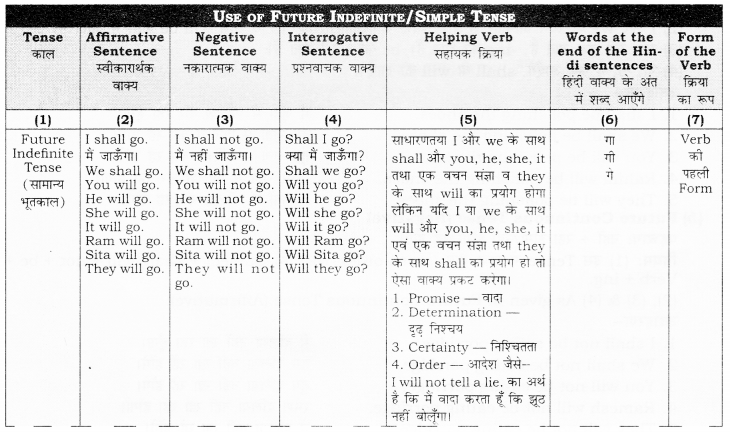

Exercise Solved
Question 1.
Fill in the blanks with the correct forms (Simple Future Tense) of the verbs given in brackets.
- ……………….. he ………………… his ways ? (not mend)
- The police ………………… into the matter. (look)
- The teacher ………………… us a lesson. (teach)
- ……………….. you ………………… after her? (look)
- Who ………………… him? (advise)
- Sohan ………………… you at the station. (meet)
- My uncle …….. us tomorrow. (visit)
- I………………… this packet to her. (not mail)
- They ………………… many people for help. (call)
- I………………… him his fault. (forgive)
Answer.
- Will, not mend
- will look
- will teach
- Will, look
- will advise
- will meet
- will visit
- shall not mail
- will call
- shall forgive
2. Future Continuous Tense
(a) Future Continuous Tense (Affirmative)
पहचानः रहा होगा/रही होगी/रहे होंगे।
नियमः (1) इस Tense में शब्द-क्रम (word-order) रहता है। Subject + shall /will + be + Verb + ing + Object.
(2) I और We के साथ आमतौर से shall be व अन्य Subjects के साथ will be काम में आता है।
(3) रहा, रही जब आते हैं, -ing को लाते हैं। be को संग बिठाते हैं।
(4) गा, गी, गे जब आएँगे, shall या will को लाएँगे।
उदाहरण
- I shall be polishing the shoes. मैं जूतों में पॉलिश कर रहा हूँगा।
- We shall be polishing the shoes. हम जूतों में पॉलिश कर रहे होंगे।
- You will be polishing the shoes. तुम जूतों में पॉलिश कर रहे होंगे।
- Rahim will be polishing the shoes. रहीम जूतों में पॉलिश कर रहा होगा।
- They will be polishing the shoes. वे जूतों में पॉलिश कर रहे होंगे।
(b) Future Continuous Tense (Negative)
पहचान नहीं + रहा होगा/रही होगी / रहे होंगे।
नियमः (1) इस Tense में शब्द-क्रम (word-order) रहता है। Subject + shall/will + not + be + Verb + ing.
(2), (3) & (4) As given in Future Continuous Tense (Affirmative).
उदाहरण
- I shall not be eating porridge. मैं दलिया नहीं खा रहा हूँगा।
- We shall not be eating porridge. हम दलिया नहीं खा रहे होंगे।
- You will not be eating porridge. तुम दलिया नहीं खा रहे होगे।
- Ramesh will not be eating porridge. रमेश दलिया नहीं खा रहा होगा।
- They will not be eating porridge. वे दलिया नहीं खा रहे होंगे।
(c) Future Continuous Tense (Interrogative)
पहचानः क्या + रहा होगा रही होगी / रहे होंगे?
नियमः (1) इस Tense में शब्द-क्रम (word-order) रहता है। Shall / will + Subject + be + Verb + ing + Object?
(2), (3) & (4) As given in Future Continuous Tense (Affirmative).
उदाहरण
- Shall I be going to office? क्या मैं दफ्तर जा रहा हूँगा?
- Shall we be going to office? क्या हम दफ्तर जा रहे होंगे?
- Will you be going to office? क्या तुम दफ्तर जा रहे होंगे?
- Will Ramesh be going to office? क्या रमेश दफ्तर जा रहा होगा?
- Will they be going to office? क्या वे दफ्तर जा रहे होंगे?
(d) Future Continuous Tense (Interrogative Negative)
पहचानः क्या + Subject + नहीं + verb + रहा होगा। रही होगी/ रहे होंगे?
नियमः (1) इस Tense में शब्द-क्रम (word-order) रहता है। Shall/will + Subject + not + be + Verb + ing + Object?
(2), (3) & (4) As given in Future Continuous Tense (Affirmative).
उदाहरण
- Shall I not be washing clothes? । क्या मैं कपड़े नहीं धो रहा हूँगा?
- Shall we not be washing clothes? क्या हम कपड़े नहीं धो रहे होंगे?
- Will you not be washing clothes? क्या तुम कपड़े नहीं धो रहे होंगे?
- Will Rahim not be washing clothes? क्या रहीम कपड़े नहीं धो रहा होगा?
- Will they not be washing clothes? क्या वे कपड़े नहीं धो रहे होंगे?
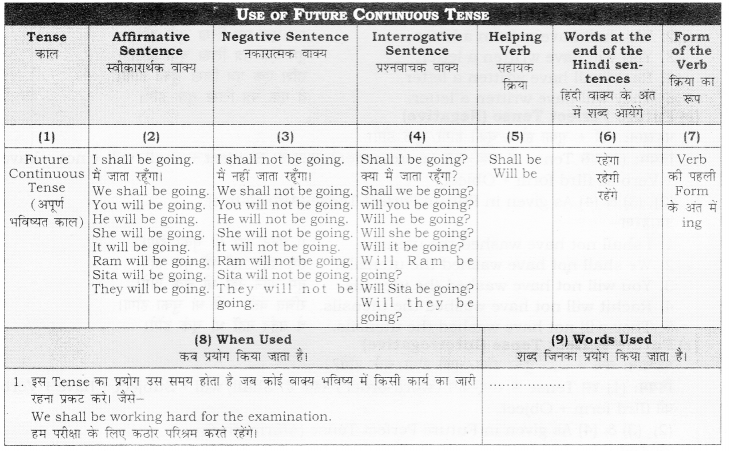
Exercise Solved
Question 1.
Fill in the blanks with the correct forms (Future Continuous Tense) of the verbs given in brackets.
- When you reach Panipat, it ………………. there. (rain)
- When you next meet him, he ………………. his school uniform. (wear)
- In a few years, computers ………………… human beings. (substitute)
- We …………………. in a minute. Fasten your safety belts. (take off)
- Our college ………………… some new courses next year. (start)
- Next month my brother ………………… to this part of India. (come)
- I………………… at the bus stand. (wait)
- She …………………… tea when you knock at the door. (make)
- They ………………… beautiful toys. (make)
- In the absence of teacher, they ………………… noise. (make)
Answer.
- will be raining
- will be wearing
- will be substituting
- shall be taking off
- will be starting
- will be coming
- shall be waiting
- will be making
- will be making
- will be making
3. Future Perfect Tense
(a) Future Perfect Tense (Affirmative)
पहचानः चुका होगा / चुकी होगी/चुके होंगे।
नियमः (1) इस Tense में शब्द-क्रम (word-order) रहता है। Subject + shall/will + have + Verb की IIIrd form + Object.
(2) चुका/चुकी/चुके जब आते हैं, has/have/had को लाते हैं। Verb की IIIrd form बिठाते हैं।
(3) गा, गी, गे जब आएँगे, shall या will को लाएँगे।
(4) Future Perfect Tense में I व We के साथ shall have तथा अन्य Subject के साथ will have – काम में लेंगे।
उदाहरण
- I shall have written a letter. मैं एक पत्र लिख चुका हूँगा।
- We shall have written a letter, हम एक पत्र लिख चुके होंगे।
- You will have written a letter. तुम एक पत्र लिख चुके होंगे।
- Rashi will have written a letter. राशि एक पत्र लिख चुकी होगी।
- They will have written a letter. वे एक पत्र लिख चुके होंगे।
(b) Future Perfect Tense (Negative)
पहचानः नहीं + चुका होगा चुकी होगी। चुके होंगे।
नियमः (1) इस Tense में शब्द-क्रम (word-order) रहता है। Subject + shall/will + not + have + Verb की IIIrd form + Object.
(2), (3) & (4) As given in Future Perfect Tense (Affirmative).
उदाहरण
- I shall not have washed the utensils. में बर्तन नहीं धो चुका हूँगा।
- We shall not have washed the utensils. हम बर्तन नहीं धो चुके होंगे।
- You will not have washed the utensils. तुम बर्तन नहीं धो चुके होगे।
- Rachit will not have washed the utensils. रचित बर्तन नहीं धो चुका होगा।
- They will not have washed the utensils. वे बर्तन नहीं धो चुके होंगे।
(c) Future Perfect Tense (Interrogative)
पहचानः क्या + …… चुका होगा/ चुकी होगी/चुके होंगे?
नियमः (1) इस Tense में शब्द-क्रम (word-order) रहता है। Shall/will + Subject + have + Verb की IIIrd form + Object.
(2), (3) & (4) As given in Future Perfect Tense (Affirmative).
उदाहरण
- Shall I have gone to school. क्या मैं स्कूल जा चुका हूँगा?
- Shall we have gone to school. क्या हम स्कूल जा चुके होंगे?
- Will you have gone to school. क्या तुम स्कूल जा चुके होगे?
- Will Palak have gone to school. क्या पलक स्कूल जा चुकी होगी?
- Will They have gone to school. क्या वे स्कूल जा चुके होंगे?
(d) Future Perfect Tense (Interrogative Negative)
पहचानः क्या + नहीं + चुका होगा चुकी होगी/चुके होंगे?
नियमः (1) इस Tense में शब्द-क्रम (word-order) रहता है। Shall/will + Subject + not + have + Verb की IIIrd form + Object?
(2), (3) & (4) As given in Future Perfect Tense (Affirmative).
उदाहरण
- Shall I not have combed my hair? क्या मैं अपने बालों में कंघी नहीं कर चुका हूँगा?
- Shall we not have combed our hair? क्या हम अपने बालों में कंघी नहीं कर चुके होंगे?
- Will you not have combed your hair? क्या तुम अपने बालों में कंघी नहीं कर चुके होगे?
- Will Sita not have combed her hair? क्या सीता अपने बालों में कंघी नहीं कर चुकी होगी?
- Will They not have combed their hair? क्या वे अपने बालों में कंघी नहीं कर चुके होंगे?
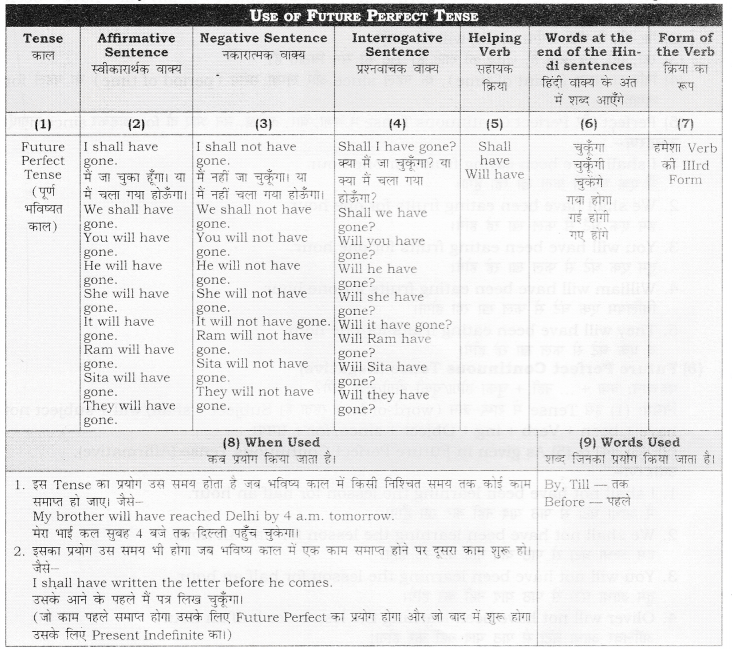
Exercise Solved
Question 1.
Choose the correct verb from those given in brackets:
- He thanked me for what I …… (have done, had done, have been doing)
- When we went to the cinema, the film ……. (already started, had already started, would already start.)
- Did you think you ……………….. me somewhere before? (have seen, had seen, were seeing.)
- I……………….. to Mumbai once before. (have gone, had gone, have been going)
- They ……………….. anything till night. (have not read, were not reading, had not read)
Answer.
- had done
- had already started
- had seen
- had gone
- had not read.
4. Future Perfect Continuous Tense
(a) Future Perfect Continuous Tense (Affirmative)
पहचानः समय के बाद से’ या ‘तक’ + रहा होगा/ रही होगी/ रहे होंगे।
नियमः (1) इस Tense में शब्द-क्रम (word-order) रहता है। Subject + shall/will + have + been + Verb + ing + Object + since/for + समय।। (2) गा, गी, गे जब आएँगे। shall/will को लाएँगे।
(3) रहा, रही जब आते हैं, -ing को लाते हैं। be को संग बिठाते हैं।
(4) निश्चित समय (point of time), के पहले since और लम्बा समय (period of time) के पहले for लगाते हैं।
(5) Perfect और Perfect Continuous Tense में बजा, वार, तारीख, सन आए तो for छोड़कर since लगाएँ।
उदाहरण
- I shall have been eating fruits for one hour. मैं एक घंटे से फल खा रहा हूँगा।
- We shall have been eating fruits for one hour. हम एक घंटे से फल खा रहे होंगे।
- You will have been eating fruits for one hour. तुम एक घंटे से फल खा रहे होंगे।
- William will have been eating fruits for one hour. विलियम एक घंटे से फल खा रहा होगा।
- They will have been eating fruits for one hour. वे एक घंटे से फल खा रहे होंगे।
(b) Future Perfect Continuous Tense (Negative)
पहचानः क्या + … नहीं + चुका होगा/चुकी होगी चुके हॉग?
नियमः (1) इस Tense में शब्द-क्रम (word-Order) रहता है। Subject + shall/will + subject not have + been + Verb + ing + Object + since/for + समय।
(2), (3), (4) & (5) As given in Future Perfect Continuous Tense (Affirmative).
उदाहरण
- I shall not have been learning the lesson for half an hour. मैं आधा घंटा से पाठ याद नहीं कर रहा हूँगा।
- We shall not have been learning the lesson for half an hour. हम आधा घंटा से पाठ याद नहीं कर रहे होंगे।
- You will not have been learning the lesson for half an hour. तुम आधा घंटा से पाठ याद नहीं कर होगे।
- Oliver will not have been learning the lesson for half an hour. ऑलिवर आधा घंटा से पाठ याद नहीं कर होगा।
- Sita and Geeta will not have been learning the lesson for half an hour. सीता और गीता आधा घंटा से पाठ याद नहीं कर रही होगी।
(c) Future Perfect continuous Tense (Interrogative)
पहचानः क्या + समय के बाद ‘से’ या ‘तक’ + रहा होगा/रही होगी / रहे होंगे?
नियमः (1) इस Tense में शब्द-क्रम (word-order) रहता है। Shall/will + Subject + have been + Verb + ing + Object + since/for + समय?
(2), (3), (4) & (5) As given in Future Perfect Continuous Tense (Affirmative).
उदाहरण
- Shall I have been sleeping since last night? क्या मैं गत रात से सो रहा हूँगा?
- Shall We have been sleeping since last night? क्या हम गत रात से सो रहे होंगे?
- Will You have been sleeping since last night? क्या तुम गत रात से सो रहे होगे?
- Will the lion have been sleeping since last night? क्या शेर गत रात से सो रहा होगा?
- Will they have been sleeping since last night? क्या वे गत रात से सो रहे होंगे?
(d) Future Perfect Continuous Tense (Interrogative Negative)
पहचानः क्या + समय के बाद ‘से’ + नहीं + रहा होगा। रही होगी/ रहे होंगे।
नियमः (1) इस Tense में शब्द-क्रम (word-order) रहता है। Shall/will + Subject + not have + been + Verb + ing + Object + since/for + समय?
(2), (3), (4) & (5) As given in Future Perfect Continuous Tense (Affirmative).
उदाहरण
- Shall I not have been learning the lesson for half an hour? क्या मैं आधा घंटा से पाठ याद नहीं कर रहा हूँगा?
- Shall We not have been learning the lesson for half an hour? क्या हम आधा घंटा से पाठ याद नहीं कर रहे होंगे?
- Will You not have been learning the lesson for half an hour? क्या तुम आधा घंटा से पाठ याद नहीं कर रहे होगे?
- Will Juliana not have been learning the lesson for half an hour? क्या जूलियाना आधा घंटा से पाठ याद नहीं कर रही होगी?
- Will they not have been learning the lesson for half an hour? क्या वे आधा घंटा से पाठ याद नहीं जा रहे होंगे?
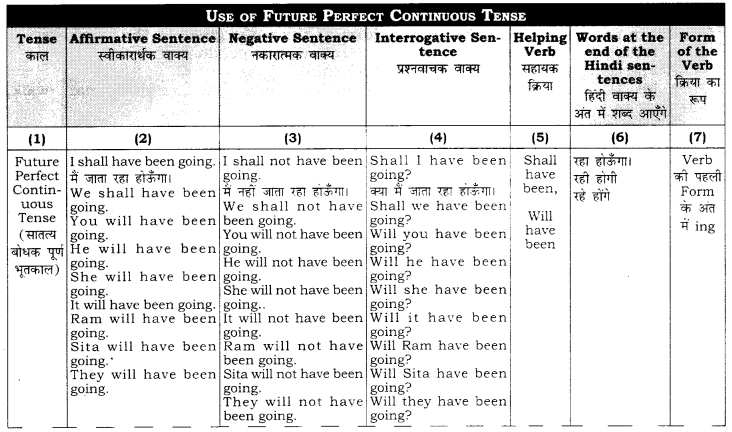
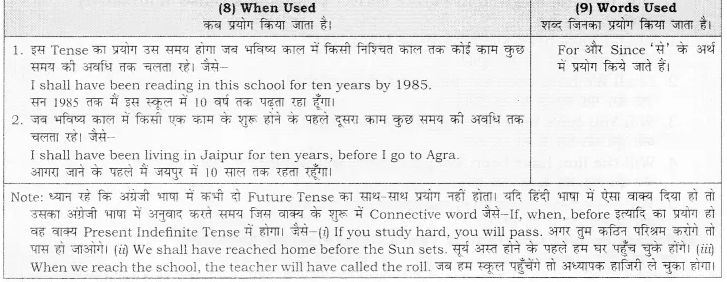
Exercise Solved
Question 1.
Fill in the blanks with suitable verb:
- You had been ………… till now since morning, (slept, sleeping, sleep)
- She ……………….. sun-bath for a month. (have been taking, had taken, had been taking)
- I ……………….. this car for four years. (have driven, had driven, had been driving)
- He had not been ………………. for a few days. (seen, saw, seeing)
- The players had been ………………… for three hours. (running, ran, run)
- …………. he been studying for examination for four days? (had, have)
- Where had he been ……………… for so many days? (lived, live, living)
Answer.
- sleeping
- had been taking
- had been driving
- seeing
- running
- Had
- living
Above provided complete RBSE Solutions Class 10 English Grammar Future Tense Study guide is reference purpose only. Students can frequently visit our page to get the latest updates on other subjects’ study materials.